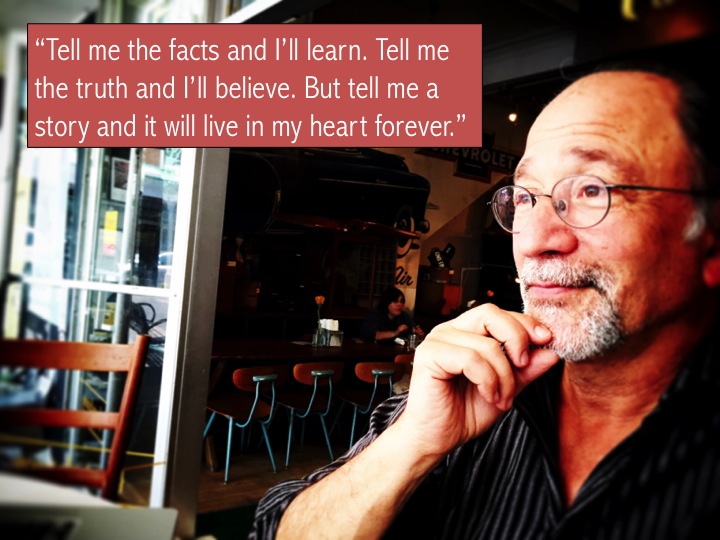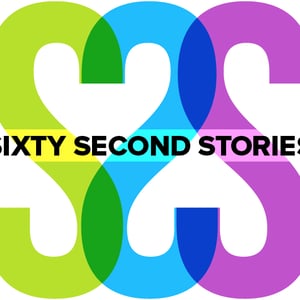One Simple Reason Why Storytelling is So Timelessly Powerful

Storytelling at Work, pub date: 11/12
FAQ about my book
25 quotes on the power of storytelling
Why create a culture of storytelling
The above quote is a classic Native American saying.
Posted by Mitch Ditkoff at 01:44 AM | Comments (0)
October 23, 2015What I Learned From Listening to Ravel's Bolero for 14 Hours Straight

During the course of a lifetime a human being goes through many rites of passage. Birth, for example. First love. The death of a loved one and enduring a Republican primary debate. For me, one of the most memorable rites of passage happened in college during my "pledge weekend" -- the weekend I was initiated into a fraternity.
I realize, of course -- especially in these politically correct times -- that college fraternities are rarely associated with anything remotely smacking of insight, awareness, or transformation. But for me it most certainly was -- at least on the rite of passage night I was initiated into Pi Lambda Phi -- an experience now permanently etched into whatever remains of my mind.
The initiation?
To sit blindfolded in a pitch black room, next to 21 of my sweating classmates, all of us holding 17 marbles in our left hands while listening to Ravel's Bolero for 14 hours.

That is not a misprint, folks. Fourteen hours of Bolero. Fourteen.
If you are not familiar with Bolero, allow me to briefly introduce it to you. It goes a little something like this: dahhhh, dah dah dah dah dah dah dah dah dah, dah, dah dah dahhhh, dah dah dah, dah dah dah dah dah dah dah dah dah dah dah dah dah.
It is, shall we say, an extremely REPETITIVE piece of music, a kind of mental military mantra, one that requires the kind of refined sensibility to appreciate that none of us in that room possessed. I think the operational word here is TORTURE -- a kind of classical music waterboarding experience I still have not yet completely recovered from. Five minutes of Bolero is usually enough for most people. Fourteen hours is like the last year of a really bad marriage.
Now here's where it really gets interesting... by the grace of the Bolero gods and the fact that the recording we were listening to had been made on a reel to reel tape player, every 17 minutes or so there would be a four second delay before the music looped back to the beginning. FOUR SECONDS. That was it. Every 17 minutes we had a four second reprieve from Mrs. Ravel's lunatic son.
What I learned during those four seconds taught me a lesson I will never forget.
Those four seconds were not memorable because of the SILENCE itself, but because of what happened DURING that silence -- the space that opened up -- a chance for the 22 of us to enjoy a blast of divine humor -- humor initiated by the youngest of us in the room that day, the Honorable Barry "Boonbeam" Birnbaum (now a much sought after attorney in New York City). What Barry did during those precious few seconds not only renewed and refreshed us, it most likely prevented the lot of us from spending the rest of our lives in a loony bin.
"Nice beat, but you can't dance to it" was Barry's comment during the first of our four second reprieves. "More bass! More bass!" was his commentary the second time around. "I much prefer the London Philharmonic version", he interjected after Round Three. And so and so on it went, 49 times every 17 minutes throughout that dark night of our collective soul.
The smiles and laughter that followed Barry's comments refreshed our minds and rebooted our souls. Humor saved the day. Humor gave us new life. Or as Gandhi once confessed: "If I had no sense of humor I would long ago have committed suicide."
Humor is the great equalizer, no matter who you are and what you do. It opens the heart, relaxes the mind, diffuses worry, energizes, uplifts, renews, restores, and rejuvenates. I like to think of it as one of the core universal truths on planet Earth. Beyond this Earth, I cannot say for sure, other than my perception that ETs from other worlds, at least in the pictures I've seen of them, never seem to be smiling. I don't get it. They all so serious. All that "advanced consciousness" and still no sense of humor. Really? REALLY?
I have no idea if extraterrestrials listen to Bolero or think George Carlin is funny, but I do know this: HUMOR IS A GIFT FROM GOD. Humor is divine. Humor is wisdom wearing a smile.
Why else do you think the court jesters had the ear of the King?
Quotes on humor and play
Idea Champions
Clarence Darrow chiming in
When dogs spark big ideas
The Syndrome Syndrome
My new book
Posted by Mitch Ditkoff at 01:41 AM | Comments (1)
October 15, 2015Creativity Has a Lot to Do With Being Able to Connect Seemingly Unrelated Elements

If you google the phrase "definitions of creativity", guess how many references you will get? 33,600,000!. Given enough time and caffeine it will only be a matter of time before you find your favorite definition. But no matter what definition you decide is the best definition, there is still one, undeniable fact about "creativity" -- that one's ability to make new connections between seemingly unrelated elements is a big plus.

Like, for example, what sparked the idea for the printing press in the fertile mind of Johann Gutenberg who, somehow saw a connection between the coin punch and wine press -- a connection that eventually lead him to conceive the notion of moveable type.
If you have five minutes, click here to listen to Idea Champions Co-founder and President, Mitch Ditkoff, elaborate on this under-appreciated phenomenon Then try it out, on your own, by clicking the link below.
A simple way to do this online
Idea Champions mothership
100 way to be more creative on the job
Let's Go Mets!
Posted by Mitch Ditkoff at 01:00 AM | Comments (0)
October 14, 2015In Defense of Brainstorming

In the past few years I have noticed a curious trend in the media -- one I can no longer ignore -- and that is the appearance of seriously derisive articles about brainstorming by self-declared pundits and free lance writers.
Citing selected research on the subject and paying brief homage to Alex Osborne, the father of brainstorming, they make bold assertions about the ineffectiveness of the method, often claiming that "it does not work" and making grand declarations like "people are more creative away from the crowd" and "over 50 years of research shows that people often reach irrational decisions in a group."
While the previous two quotes do have some degree of truth associated with them, likening a brainstorm session to a "crowd" is not only a poor choice of metaphors, it is patently untrue.
And while many irrational decisions have been made in groups since the beginning of time, to assume that irrational decisions will necessarily be made in a brainstorming session is only more proof that the writers of the recent spate of anti-brainstorming screeds have either never participated in a skillfully facilitated brainstorm session or are hopelessly late for their next journalistic deadline, refusing to take the time to go beyond their specious all-or-nothing conclusions drawn from someone else's research -- some of which is more than 50 years old.
To blatantly conclude that brainstorming sessions don't work is as absurd as saying that marriages don't work because 50% end in divorce or tourists shouldn't visit New York City because sometimes the traffic is bad.
What I'm guessing that brainstorming naysayers really mean is that bad brainstorming sessions don't work... or poorly facilitated brainstorming sessions don't work... or brainstorming sessions with the wrong mix of unprepared participants (marriage, anyone?) don't work.
Brainstorming critics like to cite a 1958 study, at Yale, that showed that students thinking on their own came up with twice as many solutions as brainstorming groups -- and their solutions were deemed to be more effective and feasible.
Fine. Good. Terrific. I'm all for people thinking on their own in their dorm room... or Starbucks... or the zoo. That's a good thing. But as a replacement for a well-run brainstorming session? Why the either/or syndrome? Why not both?
Just because you had breakfast this morning doesn't necessarily mean you should skip dinner tonight, does it?
And besides, even a casual scan of the literature will reveal an extraordinary number of innovation-leaning people who joined forces with others to conceive something brilliant that none of them could have conjured on their own.
Think Jobs and Wozniak. Think Watson and Crick, Hewlett and Packard, John, Paul, George, and Ringo -- and any number of less famous ad hoc groups of aspiring innovators, working in all kind of organizations, who came out of their corporate dorm rooms long enough to jam with other seekers of possibility to jump start bold new advances in just about every industry on planet Earth.
But wait! There's more!
The anti-brainstorming forces are also fond of asserting that creativity is stifled in a brainstorming session.
Hello! Earth to journalists on deadline writing about brainstorming for a flight magazine. To claim that creativity will invariably be stifled in a brainstorming session is like saying that creativity will invariably be stifled in a marriage... or in a school... or in an organization. Possible? Yes. Whenever two or more people with egos get together, creativity has the potential to be stifled. But inevitable? No.
On the contrary, creativity is often sparked in a group -- even groups that are cranky, competitive, and strong-willed. Indeed, "creative dissonance" is often the catalyst for breakthrough -- NOT lone wolf, ivory tower idea generators sitting alone in their room attempting to conjure up the next big thing.
Brainstorm detractors -- as least the ones I've read -- are fond of citing "social loafing', "social blocking", "free riding", and other group-centric sociological phenomenon as proof of why brainstorming sessions should cease to exist.
Yes, I agree that some people who work in organizations fit this slacker stereotype. But there is no room for this kind of energy-sucking behavior in a well-run brainstorming session -- one that has been thoughtfully prepared, the right people invited, and with a skillful facilitator catalyzing the creative process.

Would brainstorm detractors suggest that we get rid of cities because some of them are polluted, or get rid of marriages because some couples quarrel, or eliminate music because some people turn up their stereos just a little too loud when their neighbors are trying to sleep?
With all due respect (well, with at least some respect), I humbly invite the small, but very vocal anti-brainstorming faction to pause for a moment and contemplate any one of the following questions -- questions with the potential to spark the kind of creative thinking our small, but very vocal anti-brainstorming faction might have missed by not participating in a brainstorming session on this very topic.
1. How can brainstorm sessions be improved?
2. How can the facilitators of brainstorm sessions learn how to dependably spark creativity in others?
3. How can brainstorm sessions build on the good ideas generated by participants before the session begins?
4. How can team leaders or project managers ensure that the right mix of people attend their brainstorm sessions?
5. How can a group of brainstorm participants generate and abide by a set of guidelines that will radically increase their odds of generating breakthrough ideas?
6. How can brainstorming become part of a continuum of idea generation strategies in an organization, so its "idea eggs" are not all in the same basket?
5 MINUTE VIDEO: The 8 Dimensions of a Brainstorming Session
25 reasons why brainstorming sessions fail
Brainstorm Facilitation Training
High Velocity Brainstorming
What our clients say about our impact
Posted by Mitch Ditkoff at 07:47 PM | Comments (0)
October 12, 2015I'm from Woodstock. Yes, I Am.

I'm from Woodstock. Yes, that Woodstock, the famous Woodstock -- the most famous small town in the world, some people say.
Former home to Bob Dylan.
Jimi Hendrix lived here for a summer in the house right across the street from where I live now. John Sebastian still lives here, as do a ton of other musicians, artists, writers, healers, therapists, car mechanics, plumbers, electricians, and just about anyone else you'd expect to live in a small town.
Other than winter lasting six weeks too long, I love Woodstock. I've been a resident for 18 years and I'm proud to call it my home.

That being said, in the early days of starting up my consulting business, I noticed a curious phenomenon about Woodstock, or at least my relationship to it, whenever a client or prospective client asked me where I was from.
Euphemism-itus.
If I declared myself to be resident of Woodstock, I ran the risk of not only being stereotyped as a counter culture whack job, but being in cahoots with an entire generation of freaks for whom the word "corporation" was second only to "military industrial complex" on the list of buzz kills -- a moment fully capable of leaving my inquisitor with the impression that I was either dangerous, highly unqualified to be of value to their company, or a candidate to be paid in 100 pound bags of chickpeas.
So, I decided to take the low road.
With a big mortgage and a family to support, I saw no reason to scare away potential clients -- especially potential clients who, when push came to shove, were asking where I lived just to break the ice.

"Two hours north of Manhattan" was my standard response. "Upstate New York" was my backup, followed by "The Hudson Valley", "65 miles south of Albany", and the always dependable "Foothills of the Catskill Mountains".
So there I was in Munich at the International Headquarters of Allianz, one of the world's leading financial services institutions, with 142,000 employees and billions in sales.
My task? To lead a workshop, the next day, for the company's hard driving senior leadership team in an effort to jump start the launch of a company-wide effort to "gain a competitive edge through increased innovation".
Corporate speak? Of course it was. But it didn't matter to me. I didn't care what euphemisms my clients used to frame their business challenges. If I sensed even the smallest willingness on their part to become more innovative, I was there.

There, in this case, was the well-appointed, pre-dinner reception for Allianz' Senior Team and a handful of outside, consultants, like me, who had been flown in from God knows where to help the company reach its ambitious business goals.
The dress code? Business casual. The bar? Open. The client? Dutifully introducing me to anyone he could collar.
And so it went, the small talk, the head nods, the firm handshakes -- me patiently waiting for the waiter with the pizza puffs and the inevitable moment when the "Where do you live?" question would head its ugly rear.
Somewhere, in between my first and second glass of chilled 1987 Riesling, standing next to three large German men I had just been introduced to -- Guenther, Heinrich, and Hans -- the question was asked.
I opened my mouth to say "Two hours north of Manhattan", but out came "Woodstock".
Maybe it was the wine or maybe it was the cumulative affect of the past ten years of mouthing geographical euphemisms. I don't know. But whatever it was, I knew this was going to be an interesting moment.
For three very long seconds, no one said a thing. The word just hovered in the air like some kind of Superbowl Blimp.

Guenther was the first to speak.
"Wow!" he announced. "Did you actually go to the festival?"
Hans smiled broadly. "My older cousin went. Lucky bastard. I was too young."
Heinrich just stood there, expressionless, saying nothing. Then he raised his right hand and gave me a rousing high five.
"I love Joe Cocker!" he announced.
Somehow, I got the feeling that tomorrow's innovation workshop was going to be just fine.
Excerpted from my forthcoming book, STORYTELLING AT WORK: How Moments of Truth on the Job Reveal the Real Business of Life.
Idea Champions
My keynotes
Innovation Kits
Posted by Mitch Ditkoff at 12:12 AM | Comments (2)
October 10, 2015Einstein Wasn't Into Six Sigma

"Not
everything
that
can
be
counted
counts;
not
everything
that
counts
can
be
counted."
- Albert Einstein
Brainstorm facilitation training
Idea Champions
Free the Genie
Posted by Mitch Ditkoff at 08:11 AM | Comments (0)
October 07, 2015George Bernard Shaw on Innovation

"This is the true joy in life, the being used for a purpose recognized by yourself as a mighty one; the being thoroughly worn out before you are thrown on the scrap heap; the being a force of Nature instead of a feverish selfish little clod of ailments and grievances complaining that the world will not devote itself to making you happy."
Idea Champions
Innovation through storytelling
What's the problem?
Posted by Mitch Ditkoff at 10:14 AM | Comments (0)
October 03, 2015Sixty Second Stories

Here's a great resource for your organization, especially if you are looking for a creative way to integrate your brand messaging into video.
Sixty Second Stories is a design house that produces explainer videos, marketing campaign videos, and specializes in kinetic typography.
I love these people! Brilliant! High integrity! Fun!
Posted by Mitch Ditkoff at 11:26 AM | Comments (0)














